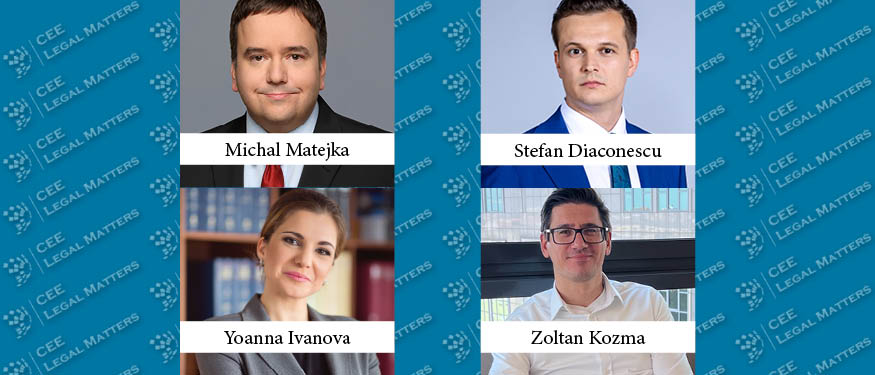In The Debrief, our Practice Leaders across CEE share updates on recent and upcoming legislation, consider the impact of recent court decisions, showcase landmark projects, and keep our readers apprised of the latest developments impacting their respective practice areas.
This House – Implemented Legislation
There have been recent updates in Croatia’s biogas energy regulations, according to Marohnic, Tomek & Gjoic Partner Josip Marohnic: “The Croatian Government has recently enacted an amendment to the Regulation on the Elimination of Disturbances in the Domestic Energy Market (Official Gazette no. 32/2024), slated to come into effect on April 1, 2024.” He adds that the “biogas plants have encountered significant setbacks in the incentive system due to escalating costs of the raw materials essential for their production processes. Many plants faced closure. Effectively, the regulation will keep most biogas plants operative and thereby keep this valuable baseline power in the system.” Marohnic further notes that “the regulation introduces measures to alleviate these difficulties by allowing biogas plants to petition for a review of their tariff, factoring in the increased cost of raw materials starting from 2021. Moreover, for biogas plants that had to exit the incentive system due to unattainable PPA tariff, there is now a pathway for re-entry.”
In Slovenia, a new law governing credit purchasers and credit servicers of the non-performing loans issued by the banks has been enacted, according to Jadek & Pensa Partner Nastja Merlak. “It aims to simplify the process of purchasing and servicing NPLs, following an EU directive. This regulation is viewed positively as it streamlines a previously highly regulated field,” according to Merlak, who adds that “previously, a special license was required for purchasing NPLs involving consumers, which was issued by the Slovenian regulator. Now, credit servicing activities, which will be required when consumer NPLs, are purchased will still be subject to a license, however, the license will be subject to EU passporting.”
As for Greece, Drakopoulos Senior Associate Avgi Lortzie draws attention to a new anti-bribery law that initiates criminal liability for legal entities. “Following OECD Anti-Bribery Recommendation, Article 134 of the new Law 5090/2024 entered into force on February 23, 2024, providing for the first-time criminal liability of legal entities per se and their successors,” she notes. Lortzie says that the new law specifies that if an individual commits bribery, among others, on behalf of a legal entity, “whether acting solely or as a member of the entity’s management and maintaining a position as an executive or has the power to represent the legal entity or authority to reach decisions on behalf of the legal entity or has the right to exercise control within them, the legal entity shall be subject to fines ranging from EUR 50,000 to EUR 10 million.” She adds that “the legal entity may also be subject, either cumulatively or separately, to the definitive or temporary withdrawal or suspension of its license for a period ranging from one month up to two years, or the prohibition of its business activity.”
According to Avellum Managing Partner Mykola Stetsenko, Ukraine took a significant step toward reforming local state-owned enterprises (SOEs) with the enactment of Law No. 3587-IX on March 8, 2024. “The law, set to become fully operational within a year, introduces a new framework for SOEs, which includes transparent corporate governance requirements aligned with the OECD standards.” Stetsenko explains that the central part of these reforms “is the obligation for SOEs, meeting certain criteria yet to be developed by the government, to establish supervisory boards (with a majority of independent members). These supervisory boards will have extensive powers, including the appointment and removal of executives and approval of financial, strategic, and investment plans of SOEs. Further, SOEs will undergo regular performance evaluations.” Under the law, Stetsenko notes, “the government must now develop the State Property Policy (SPP), which will be subject to regular review and updates. The SPP will set out the state’s principles regarding SOEs, identifying strategic SOEs and those to be privatized. This document aims to bring stability to the operation of SOEs, offering clarity to prospective investors.”
This House – Reached an Accord
Schoenherr Bulgaria Partner Tsvetan Krumov reports that “a new Bulgarian National Bank Act was enacted on February 13, set to enter into force on the day Bulgaria accedes to the Eurozone. Bulgaria’s authorities aim for such an accession to occur on January 1, 2025, but there are still some requirements to be met.”
Debarliev, Dameski & Kelesoska Senior Associate Sofijana Markovska notes that, in North Macedonia, in response to the price freezes on vital food items as a result of the COVID-19 pandemic and subsequent global energy disturbances, “in March 2024, North Macedonia adopted the Law on the Prohibition of Unfair Trading Practices in the Agricultural and Food Supply Chain. This legislation aims to rectify the power imbalances disadvantaging smaller producers and suppliers in their dealings with larger buyers, establishing a more balanced commercial environment that fosters sustainable relationships within the supply chain.” Markovska adds that the law sets forth “the requirement for transparent/written contracts, which must detail critical aspects of trade arrangements, including (i) pricing mechanisms, (ii) quality standards, (iii) delivery timelines, and (iv) payment conditions. These provisions ensure that all parties have a clear understanding of their obligations, reducing the likelihood of disputes and unfair practices. Further, the law specifically addresses the issue of ‘significant bargaining power,’ setting clear revenue-based criteria to determine when a party possesses such power and is thus subject to stricter scrutiny.” As the appointed enforcer of the new law, the Commission for Protection of Competition in North Macedonia “takes on an expanded role beyond its existing mandates under the Law on Competition Protection, the Law on State Aid Control, etc.,” and “in cases of non-compliance, the commission wields power to impose sanctions and pursue legal remedies to correct infringements, thus ensuring the integrity and competitiveness of the agricultural and food supply sectors.”
The parliament of North Macedonia has also adopted the new Law on Financial Instruments on March 13, according to Law Office Lazarov Managing Partner Dragan Lazarov. “The new law completely repeals the existing Law on Securities, and “in a package” with the new Law on Prospectus, introduces substantial harmonization with EU legislation.” According to Lazarov, “this legislation aligns the requirements of the financial institutions in North Macedonia with those of the EU, with respect to funding, authorization, and operating conditions for investment firms, client protection, risk management, management authorities, and supervisory capacities, but also authorization and operation of regulated markets, authorization, and operation of data reporting services providers and others.” Additionally, he notes that “the law gives a vacatio legis of 18 months and an additional 12 months of adjustment for all investment firms, market operators, and other market participants.”
This House – The Latest Draft
Merlak reports that “there’s a legislative proposal in response to the affected former holders of qualified liabilities of banks, which were canceled by the Bank of Slovenia in the last major financial crisis where two of our major banks were bailed out by the Slovenian government. Previous attempts to regulate the compensation sought by such former holders were declared unconstitutional.” According to her, “now, based on lessons learned from a decision by the constitutional court, a new proposal suggests that the state will be liable to the qualified holders for damages suffered, but will be able to seek recourse from the Bank of Slovenia for any damage attributable to the Bank of Slovenia’s breach of due diligence in enacting the measures.”
Krumov also highlights that, in Bulgaria, “a draft Act on Credit Servicers and Credit Purchasers was released by the government for public consultations on February 9. The draft’s objective is to implement domestically EU Directive 2021/2167, establishing a common framework for credit servicers/purchasers of non-performing loans.”
In Poland, a new version of the draft law on whistleblower protection was published on the government website at the beginning of March, according to Wolf Theiss Poland Associate Sonia Kurpiel. “The draft introduces several significant changes, including the expansion of the catalog of reportable infringements of the law to encompass breaches of labor law and constitutional freedoms and rights of human and civil liberties,” Kurpiel notes. “Clarification has been provided regarding the moment when a whistleblower’s protection begins. A whistleblower will be protected from the moment a violation is reported, provided that they have reason to believe that the information being reported is factual and constitutes a violation of the law.” Additionally, Kurpiel says, “the draft sets the minimum damages a whistleblower will be entitled to if punitive action is imposed against them at an amount not lower than the average monthly salary in the national economy for the previous year.” She adds that “a new method of counting 50 persons performing remunerated work for a legal entity has been established,” and “the law will enter into force three months after the date of promulgation.”
The Verdict
Krumov highlights a recent judgment of Bulgaria’s Supreme Court’s “solving some controversial questions on receivables assignments.” According to him, “arbitration clauses in agreements giving rise to receivables were ruled to be an ancillary element of receivables being automatically transferred alongside assignment of receivables. The judgment’s logic should arguably apply also to jurisdiction clauses where foreign courts (rather than arbitration tribunals) are chosen as competent which is important for, e.g., cross-border securitizations where assignees are willing to avail of a choice of court/arbitration clause.”
In the Works
CMS Bulgaria Managing Partner Kostadin Sirleshtov reports that, over the last weeks, “Bulgaria took solid steps into the implementation of its largest investment project to date – the construction of Units 7 and 8 of the Kozloduy Nuclear Power Plant. Following the selection of Westinghouse Electric and its leading AP 1000 technology, which was made by the Bulgarian Parliament in 2023, in March 2024, Bulgaria selected Hyundai Engineering and Construction as the EPC contractor for the project. This will allow for debt financing from both US Exim and KSure, following the decision of the Bulgarian Government to allocate EUR 1.5 billion equity to the project.” Additionally, Sirleshtov notes that “in March 2024, Bulgaria also launched its long-awaited tender for PV + battery storage to be supported by up to 50% grants from the Recovery and Resilience Fund of the EU. The deadline for submission of proposals is June 12, 2025,” with the CMS Partner adding: “The expiry of the 15-year Power Purchase Agreement for the lignite-fired Maritsa East 3 thermal power plant at the end of February 2024 marks another milestone in the transition to renewable energy dominated energy mix in Bulgaria, following the over 2 gigawatts new PV capacities put in operation in 2023.”
Done Deals
According to Merlak, the Slovenian government has decided to issue “people’s bonds,” which can only be purchased by individuals residing in Slovenia. “The Slovenian capital market isn’t very developed – people don’t invest much in financial instruments, many companies are leaving the regulated market, and Slovenians mostly invest in real estate or keep their money in banks,” she notes. “So far, almost 9,500 investors have collectively invested EUR 260 million. There’s a glimmer of hope as 5,000 new trading accounts have been opened recently, allowing for further investment after the initial cost. This initiative was completed just a month ago.”
Regulators Weigh In
Nestor Nestor Diculescu Kingston Petersen Partner Anca Diaconu notes that, at the beginning of March, the Romanian Competition Council (RCC) initiated an analysis concerning the conduct adopted by the holders of single software licenses toward distributors in the context of the participation of the latter in public procurement procedures for software licenses. “As per the authority’s press release, the licensing agreements concluded between single software license holders and their distributors, as well as the criteria established by the contracting authorities in the documentation relating to the award procedure, are both under scrutiny,” she notes. “In particular, it seems that the authority is looking into whether (i) single software license holders impose discriminatory conditions or refuse access to licenses to distributors (acting as tenderers) and (ii) the contracting authorities impose excessive criteria in this context.” Diaconu notes that this endeavor is yet another expression of “RCC’s particular interest in and close supervision of competition within public procurement.”
Act Legal WMWP Partner Roman Hager notes that in Austria, there’s an expected easing of real estate financing restrictions. “Like many countries, Austria’s real estate sector is facing a downturn, with a significant decline in private real estate transactions since 2022,” Hager adds. “A key factor behind this slump is the stringent regulations imposed by the Austrian banking regulator. The Austrian Financial Market Authority introduced a regulation on August 1, 2022, to mitigate systemic risks in residential real estate financing.” According to Hager, “to facilitate a more manageable administration of exception quotas, the Financial Market Stability Board has recommended a revision to the KIM-V regulation. The proposed amendment, based on § 23h of the Banking Act, suggests a unified institution-specific exception quota of 20% for new lending, eliminating the need for separate quotas for different metrics.”
In the last month, there has been an exceptional development in the area of merger clearance in Slovakia, according to Ments Associate Simon Hora. “The Slovak Antimonopoly Office (AMO) granted an exemption from the general prohibition to implement a merger prior to merger clearance in the case of acquisition of direct sole control over 27 petrol stations of the company Benzinol by OMV Slovakia.” Hora adds that “as reaffirmed by this case, the AMO grants exemptions only in cases where it is evidenced by the information and documents submitted that there will be no negative effects of the merger on competition within a relevant market and the circumstances of the case warrant such approach. Granting such an exemption from the prohibition to implement a merger is not common in Slovakia and this institute has been used only exceptionally.” Additionally, “we believe that similar, less common practices will be further pursued by undertakings and AMO in the future and that they will enrich the competition law practice in Slovakia,” Hora notes.
Finally, the Turkish Competition Authority, the Turkish antitrust watchdog, issued three remarkable decisions last month, Nazali Tax & Legal Associate Ahmet Onder says. “The first one was an interim measures decision, within the scope of an ongoing investigation initiated against Meta Platforms, Inc., dated March 18, on suspicion of abusing its dominant position by linking Threads and Instagram applications. The Turkish Competition Authority ruled that Meta’s merging of the data of users who create Threads profiles based on their Instagram accounts, without providing users with the option of consent, will cause irreparable harm until the investigation is formally completed and an interim measure has been given that Meta will prevent the merging of data obtained through the Threads application with data obtained from the Instagram application.”
The second decision, according to Onder, was also against Meta. “In 2021, the authority determined that Meta combined the data collected from Facebook, Instagram, and WhatsApp services, making it difficult for its competitors operating in the social networking services and online display advertising markets and creating an entry barrier to the market, and imposed certain sanctions,” Onder notes. “Accordingly, the authority decided that Meta had abused its dominant position by combining data collected from Facebook, Instagram, and WhatsApp services, and an administrative fine of TRY 346.71 million was imposed on Meta together with a set of measures in order to eliminate the violation and establish effective competition in the market. However, the final compliance reports submitted by Meta to the authority, for this decision, were deemed insufficient. Following the expiration of the deadline granted to Meta, a daily administrative fine of TRY 4.8 million has been imposed.”
The third development, according to Onder, “is the violation and fining decision in the labor market regarding no-poaching agreements among a number of undertakings operating in the information technologies and informatics industry. This decision draws attention as the third cartel decision of the Turkish Competition Authority against labor market violations.”
This article was originally published in Issue 11.3 of the CEE Legal Matters Magazine. If you would like to receive a hard copy of the magazine, you can subscribe here.













